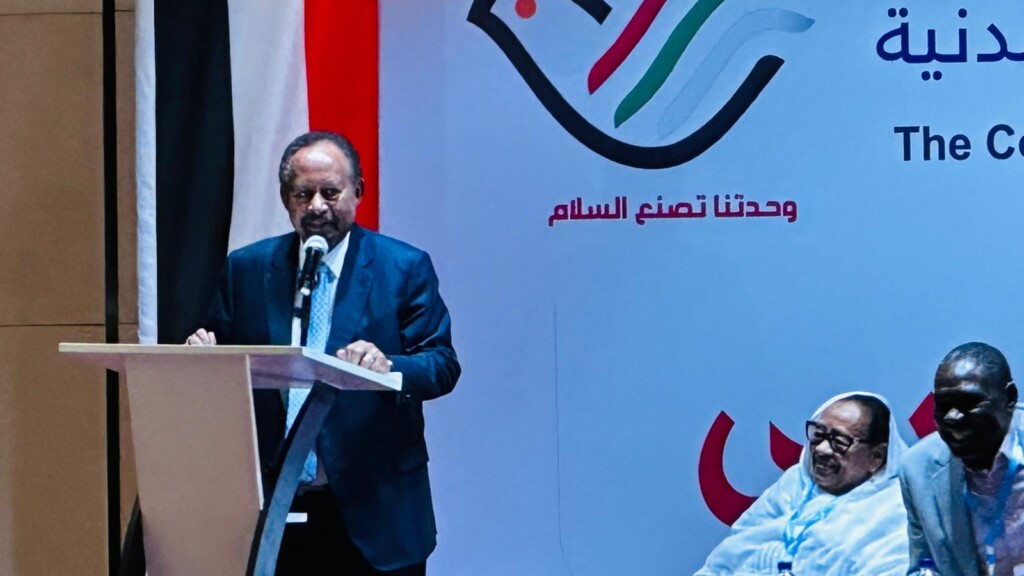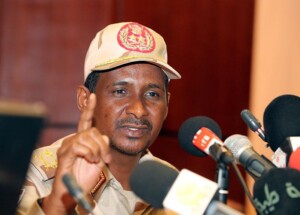Tagadom launches awaited conference to end Sudan war

Tagadom leader Abdalla Hamdok during his opening speech at the founding conference of the Civil Democratic Forces (Tagadom) in Addis Ababa, Ethiopia, on May 27 (Photo: RD)
The Civil Democratic Forces alliance (Tagadom) is holding its founding conference in Addis Ababa from May 27 to 30, with over 600 participants attending. The conference aims to build the broadest civil front to stop the war and restore the civil transitional path in Sudan.
The founding conference, postponed several times and originally scheduled for May 26, was moved by one day “so that the rest of the participants can attend,” said Tagadom spokesperson Bakri El Jak in a press conference at the Skylight Hotel in Addis Ababa, the capital of Ethiopia, on Sunday.
“So far, 450 participants have arrived, and it is expected that the number will reach 550 tomorrow out of a total of 600 participants,” he confirmed, noting the presence of observer delegations from the Sudan People’s Liberation Movement-North faction (SPLM-N), and the Popular Congress Party (PCP).
Tagadom includes political and civil society groups that reject the ongoing war in Sudan, with its leadership body headed by Abdalla Hamdok, the prime minister of Sudan for two years after the ousting of President Omar Al Bashir. The Forces for Freedom and Change (FFC) alliance is considered the main member of Tagadom.
In his opening address, Hamdok called on both sides of the war to cease hostilities immediately. He urged the international community to pressure the conflicting parties to return to negotiations with an integrated vision for a solution, aiming to restore the path of transition and achieve peace, justice, and democracy.
“Our efforts are not because we are a party to the war, nor do we stand neutral. We are biased towards the hungry, the poor, refugees, and the displaced. The democratic program is for a homeland that accommodates everyone. Tagadom is a step in the right direction, but it does not represent all of Sudan,” pointing to the need for a round-table conference to discuss the Sudanese crisis in all its aspects.
Siddig El Mahdi, a member of the preparatory committee for Tagadom, said: “The conference represents the largest civil alliance in Sudan against the war,” expressing apologies to those unable to attend and emphasising that a third of the participants came from outside the alliance, showing its commitment to expanding and building the largest civil front.
Abdelrahim Ali, a representative of the resistance committees, told attendees in a speech: “The solution does not come from the barrel of a gun, but through collective action for peace and the return of democracy and civil rule.” He described the founding conference of Tagadom as a new phase of building a state founded on justice, peace, and change.
This conference comes weeks after the ‘Understanding Framework Vision for Managing the Transitional Founding Period’ was signed by the Forces for Freedom and Change-Democratic Bloc and other political and civil groupings in Cairo, the Egyptian capital, aiming to build a united front to stop the war and resume the transitional path.
Cairo Charter
Commenting on the similarities between the Cairo and Addis Ababa meetings, Osman Mirghani, editor-in-chief of the Sudanese El Tayar newspaper, explained: “Based on a very careful follow-up of all political efforts on various tracks, if these parties were asked to identify the points of disagreement between them, that would be a difficult question.”
In an interview with Radio Dabanga, Mirghani said the large number of similarities will make it difficult for the two parties to identify points of difference, as their proposals are very similar.
“When the Sudan Charter was presented in Cairo, many people, including journalists, noted that it was like the proposal presented by Tagadom, even though the Cairo document was written hurriedly, and most journalists saw it at the closing press conference.”
The editor-in-chief of El Tayar noted that the differences between the two proposals of the two blocs are “personal and psychological rather than substantive”. He emphasised that both alliances provide an opportunity for political forces to come together, agree on goals, and work out the means later. “The priority must be to stop the war, then build the state and peace, and complete the transitional period.”
Mirghani called for a meeting between the two warring parties, the Sudanese Armed Forces (SAF) and the paramilitary Rapid Support Forces (RSF), urging political parties to participate in the Jeddah platform and realise that peace comes from politicians, not the military. “Politicians can provide joint concessions to achieve peace, and if convinced, they can move strongly and collectively, bringing together parties outside the two umbrellas, including national forces in Port Sudan.”
He emphasised the need for these parties to unite to achieve the primary goal of stopping the war, “a political decision before a military one, allowing them to return to normal activities”. He concluded that politicians must impose their will on the military leadership by “withdrawing the legitimacy of the current war”.











 and then
and then